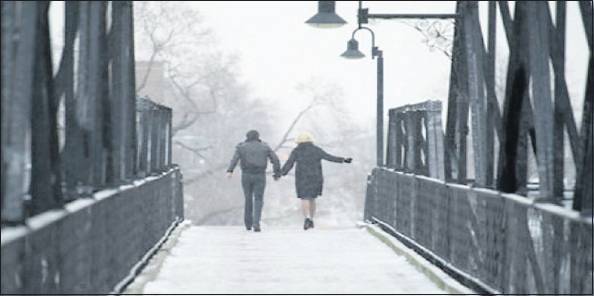I’m not going to tell you much about Sarah Polley’s new documentary “Stories We Tell,” showing at the Movies at the Museum Friday through Sunday at the Portland Museum of Art. But by the end of this review, you’re going to want to see it. It’s a neat trick, but then so is “Stories We Tell,” in which actress/filmmaker Polley interviews members of her family about their shared experience of Polley’s mother, Diane.
As the film begins, Polley is setting up the interviews, with each subject more or less uncomfortable about what she’s asking them to do.
“Just tell the whole story from beginning to end,” she instructs, adding jokingly to her father Michael, “We’ve told you it’s a documentary. But it’s an interrogation process.”
In the movie, which is being co-presented by Space Gallery, you’ll most likely recognize Polley, a former child actress (“The Adventures of Baron Munchausen”) turned talented adult actress (“The Sweet Hereafter,” “Slings & Arrows”) turned acclaimed director (“Take This Waltz,” “Away From Her”).
Here, she turns her cameras on her family and herself, a conceit that risks wearing thin. The story of the Polley family has more than its share of twists and turns, certainly, but, in an age where even the most minor celebrities’ lives are scrutinized on one screen or another, one might be tempted to ask why this actress’ life should be the subject of a major documentary.
What elevates “Stories We Tell” to something both riveting and heartbreaking is Polley’s approach to her family’s history, which incorporates an examination of the act of telling, and memory, into the structure of the film itself.
And here’s where I’m going to be a little cagey, because one of the chief pleasures of the film is the way Polley’s storytelling technique gradually reveals details of Diane’s life in ways that change the viewer’s perceptions of her, and everything that’s been said to that point.
Polley springs the first such twist at the 20-minute mark and then keeps them coming, each successive revelation forcing the viewer to re-examine what’s come before and what it says about each teller.
(Polley reinforces her theme by almost imperceptibly using authentic-looking footage of actress Rebecca Jenkins to supplement actual home movies of her mother throughout the film, the meta-textual sleight-of-hand muddying the notion of truth right in front of our eyes.)
The dominant voice among the interviewees is Michael Polley, Sarah’s British-born father, who recounts his version of Diane’s story from the memoir he’s written.
Narrating his family’s often painful history in the third person, Michael is almost unbearably affecting, his melodious, querulous old man’s voice observed from the recording studio’s control room by Sarah, whose expression remains enigmatically sad for reasons we only understand by degree.
Their relationship is the heart of the story – two people still working through the way Diane’s actions are affecting them, and those they love, even decades later.
As Polley laments late in the film, “I can’t figure out why I’m exposing us all in this way. Trying to form her… from other people’s words? Trying to put her together from the wreckage, and her slipping away from us.”
“Stories We Tell” is Polley’s achingly poignant tribute to her family, and the woman whose restless spirit haunts them all.
Dennis Perkins is a Portland freelance writer.
Send questions/comments to the editors.


